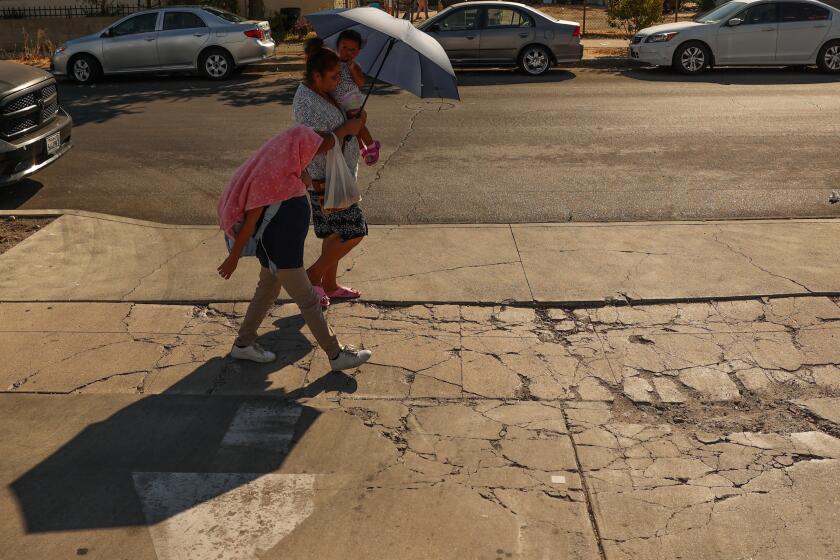Angelenos in San Luis Obispo: Wave of Resentment
San Luis Obispo is one of California’s most attractive cities. It lies on a creek below the Santa Lucia Mountains. It is temperate. The air is clean. It grew up around one of Junipero Serra’s missions. It has a highly rated state university. The setting is pastoral. The pace unhurried. Crime and drugs are no big problems.
Until recently. Now San Luis is plagued by emigrants from Los Angeles. San Luis has always appealed to Angelenos, but now, by the hundreds, they are selling their houses in Los Angeles at inflated prices and buying cheaper houses in San Luis.
San Luis resents the Angelenos, and the Angelenos sense the hostility. I first became aware of this conflict in a letter from Jorge Aguiniga, who quit his airline job in Los Angeles, sold his home, bought a house for $425,000 in a community five miles south of San Luis, and moved there with his wife and children.
He loves it. By comparison, he says, living in Los Angeles was like “a self-inflicted penance. . . . The weather is simply idyllic. I feel rejuvenated by the clean country air. . . . Our children will grow up touching the redwoods we planted at the entrance to our home and counting the cows which roam the pasture areas surrounding our development.”
Most of the 250 families that live in his colony are from Los Angeles. His house was one of the cheapest. “Most are middle-aged, former business executives or professionals with small children. Only a few are retirees. We all seem to agree about the reasons which motivated us to leave the big city. Raising our children in a drug-free environment seems to top the list.”
But most feel the local resentment. “There are newspaper articles almost daily which refer to us as ‘rich city retirees,’ ‘L.A. refugees,’ or ‘L.A. aliens.’ A recent letter-to-the-editor even characterized us as ‘rich city trash.’ ”
The locals complain that Angelenos have driven up real estate prices so high that they themselves are excluded from the new neighborhoods. “People who had hoped to move up from their modest residences now feel locked out.”
Aguiniga insists, however, that not all Angelenos are living off the profits on their L.A. house sales. “The fact is that most of us are making lateral purchases and many of us will still have mortgages to pay.”
At a dinner meeting of the Cal Poly Library Associates, I found members of the academic community rather reticent about the Angeleno emigrants. But Dave Garth, executive manager of the San Luis Obispo Chamber of Commerce, was outspoken.
He said there has been a “huge influx” of people from Los Angeles and Orange counties. “They just want a cheaper way to live. They haven’t rejected the Los Angeles life style or accepted that the San Luis life style is different.”
He said that when people “plop down $500,000” on a house they expect to get some attention. One woman was incensed, he said, because she couldn’t find a neighborhood of $1-million houses. Others have complained that “there’s only one Mercedes dealer in town.”
Angelenos also bring reckless driving habits, he said. They not only try to catch the end of the yellow light at intersections, they run the red. (That indeed is now a common practice in Los Angeles.) “People in the fast lane can really be offensive.”
Garth said he himself came to San Luis from Los Angeles 17 years ago, but at that time Angelenos respected the San Luis life style, and were in turn respected.
He said San Luis Obispo has been called one of the three most attractive communities in California. But residents are no longer sure that such a reputation is a blessing.
We spent our second night at the Madonna Inn. The inn features a bizarre diversity of rooms, from an Austrian royal suite (in which we stayed some years ago) to a Neanderthal cave (with plumbing). When you register, you are given a free post card with a picture of your room. This time we stayed in the Swiss Chalet. It was comfortable and comparatively modest, although, like most of the rooms, it was unabashedly kitsch.
For example, our cocktail pitcher and glasses, which looked from a distance like cut glass, turned out to be molded plastic.
Being from the capital of kitsch, we felt at home.
More to Read
Sign up for Essential California
The most important California stories and recommendations in your inbox every morning.
You may occasionally receive promotional content from the Los Angeles Times.










